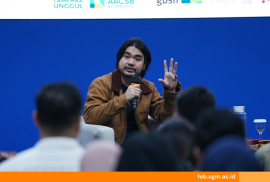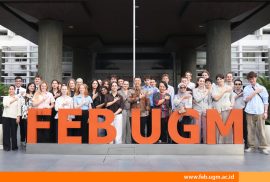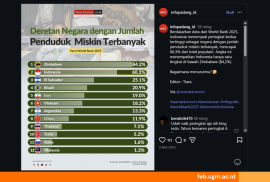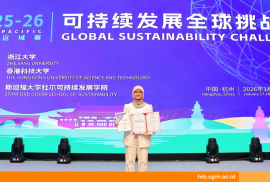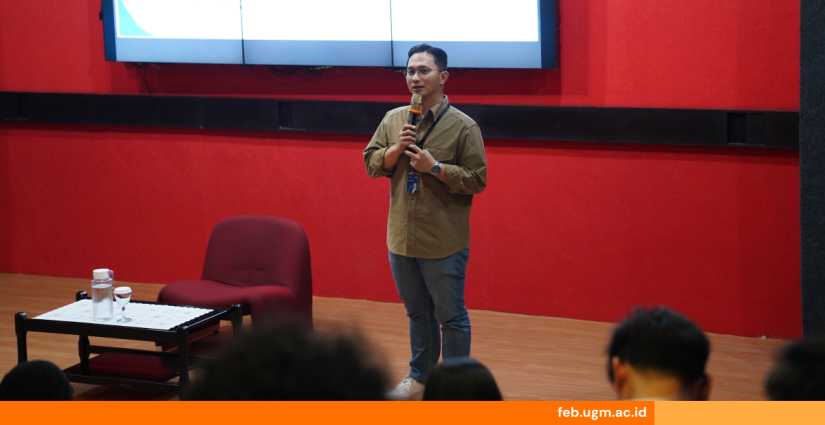
Practical communication skills, self-awareness, and the ability to convey values convincingly are essential for success in job interviews. This awareness is what the Mandatory Soft Skills: Interview Skills activity aims to foster. The event was organised by the Career and Student Development Unit (CSDU) of FEB UGM in collaboration with Lutfi Anggriawan, MR 5, CFP, CHRM, Branch Office Head (Assistant Vice President) of BRI Yogyakarta Cik Ditiro Branch, who is also an alumnus of FEB UGM’s Management programme.
Lutfi explained that interview skills refer to a candidate’s ability to present themselves and their competencies effectively during the interview process, encompassing both verbal and non-verbal communication, as well as the capacity to answer questions appropriately and purposefully. An interview is not just about answering questions from the interviewer, but also about how a person presents themselves, their thought process, and how they incorporate their personal values into the professional world.
“Interview readiness is not the result of memorisation, but rather a process of reflection and thorough preparation that includes knowledge about oneself and the company being applied to,” he said on Friday (7/11/2025) at FEB UGM.
Lutfi explained that the first step in preparing for an interview is to conduct in-depth research on the company and the position being applied for. By understanding the background, vision, and values of the organisation, candidates can tailor their answers and attitudes to align with the company culture. In addition, participants also need to prepare their self-branding or the image they want to present.
Furthermore, he encouraged participants to review their relevant experiences and achievements as material for self-reflection. Every academic, organisational, and social activity can be concrete evidence of a person’s competence. In addition, interview readiness encompasses not only technical skills but also soft skills such as communication, empathy, and cooperation, as well as a professional appearance and complete documents. Ethics are no less critical than politeness, punctuality, and respect for the interviewer, which are forms of appreciation for the selection process.
To build confidence, Lutfi advises students to practise mock interviews in front of a mirror. Through this simple exercise, participants can observe their facial expressions, tone of voice, and body language to ensure they appear natural and convincing. He also encourages students to actively participate in career days or recruitment fairs as a means of practising direct interaction with companies. According to him, these activities not only open up career opportunities but also provide authentic learning experiences in facing the world of work.
Lutfi also highlighted four key aspects that are crucial for a successful interview, namely creative and analytical thinking, empathy and active listening, motivation and self-awareness, as well as resilience, flexibility, and agility. These four skills provide a crucial foundation for students to navigate the challenges of a dynamic work environment. To demonstrate creative and analytical thinking skills, he also introduced the STAR technique, which consists of Situation, Task, Action, and Result. This technique helps candidates answer questions in a structured manner, focusing on what the interviewer wants to assess.
For example, when the interviewer asks, ‘Tell me about the biggest challenge you have ever faced and how you overcame it,’ many candidates tend to respond with long, unfocused stories. However, what the interviewer wants to know is how a person thinks, makes decisions, and acts in real situations. By using the STAR technique, candidates can explain the context of the situation they faced, the responsibilities they had, the actions they took, and the results they achieved. This approach helps interviewers assess candidates’ analytical and reflective abilities and work style in concrete terms.
Furthermore, Lutfi also explained the four general stages in the job interview process that are commonly used by Human Resource teams. The first stage involves general questions or self-introductions, during which candidates are asked to present their educational background, experience, and values. The second stage covers competency questions, which focus on technical skills and relevant work experience for the position being applied for. Next, the third stage consists of questions about personality and work attitude, which assess character, ethics, and how a person adapts and works in a team. The fourth stage is questions about goals and expectations, which reveal the candidate’s motivation, desired career path, and the compatibility between personal aspirations and the company’s vision.
In addition to critical and analytical thinking, Lutfi also emphasises the importance of adaptability and empathy. Adaptability reflects a person’s ability to accept change, learn quickly, and remain productive, while empathy demonstrates sensitivity in understanding the feelings and needs of others. According to him, these two skills complement each other; adaptability helps a person cope with changes in the work environment, while empathy helps them understand the impact on colleagues or teams. In interviews, demonstrating adaptive and empathetic attitudes is proof of character maturity and readiness to work in a diverse environment.
Reportage by: Orie Priscylla Mapeda Lumalan
Editor: Kurnia Ekaptiningrum




